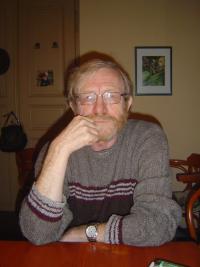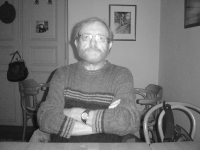"Well, I'll say again for safety's sake, I had already been presenter for Lipnice the year before. And it had been great, only I found out as master of ceremonies that there is always this one troublesome moment for the audience - when the band changes and they're setting up their instruments and so on. So the first year I solved that, I dunno, by telling jokes or something, and so that it wouldn't happen again, I reckoned: how should I fill in those gaps? Again, a complete chance. I already knew the director Helena Třeštíková who happened to be visiting Lipnice to shoot some footage for, I dunno, some film about youth or about some young people. I was wondering how to fill in the gaps, and Helena was already quite well known, some of her stuff had been broadcast in the television, so: 'Hey, Helena, I'll get you on stage during the break and we'll just do an interview like with a director about your work and about young people.' And she agreed. We arrived at Lipnice where we met up with my friend and stage director Jarmila Poláková and I told her about this idea of mine. She took on to it very much, saying yes, it would be refreshing and also she said: 'Look, Joska Skalník is here too, people know him from the Jazz Section, he would be great as well...' I said: 'Yeah, sure.' And already I reckoned that we had the gaps filled like that. But then Jarmila, I think she kind of invited Havel along, and she said: 'Well, look, there's Vašek here too.' I replied: 'I know Vašek is here. So what?!' She said: 'Well, if we've got a film maker and an artist, then a writer would also...' I said: 'Look, I don't care. But it'll cause hell.' She said: 'Well, it'll cause hell. Look, I'll go ask. Not him yet.' And dear Jarmila went backstage where she asked really just the right people: Honza Burian and Petr Skoumal. They were thrilled, saying definitely Havel yes... So she came back saying that it was okay. I told her: 'Alright, but it'll cause hell like crazy.' She said: 'Yeah, I guess so.' - 'Okay.' She went to get Havel in the auditorium, in the meanwhile I was introducing a band or something, then there was another break and I, and that's already been recorded, I said what I said and I pulled Havel out. But before that he came into the back and he was terribly nervous and he also told me the same as Poláková did. I think he was informing me that if they put me in jail then he would give me the pamphlet about how to behave in prison. So I thanked him, I guess we were on first-name terms by then. And I think I can tell one secret, it'll make him a bit more human: I think that he was so nervous he kept rushing off to the toilet, and I think that he soothed his nerves with a shot of something or other before going on stage. But nonetheless, we're ready to go, and now the funny bit starts. We're ready to let him on stage, Havel's right behind me. And suddenly this heavy hand lands on my shoulder. So I think - it had to end like this, of course. And it's the local fireman, and like in a Forman film he says to me: 'You're the presenter of this concert here?' I reply: 'Yeah, I'm the presenter, what's up?' - 'Look, please -' It's necessary to imagine the hillside below Lipnice castle, where the toilets where, quite immobile, kind of on the hill to the left when looking from the stage. Well, and the fireman tells me: 'Look, please, tell the people to get out of the way, we can't drive up there with the honey wagon. You know, so we can...' - 'Not now, in a minute, there'll be an interview here now.' So I dealt with the fireman and what followed is the well-known stuff, where I stated that we had had someone from the film industry, someone from the art scene, and so now we would have a playwright. And when I spoke Havel's name, then to this day I still think it was as if the ten thousand people or however many there were had an heart attack. Because Lucifer had appeared. I mean the Devil. Almost everyone knew his name, but not Havel in person. I asked him two mundane questions, he spoke about the conspiracies and said it had been twelve years since he had last spoken publicly. And I told him: 'That's just about right.' And the shock. So I thanked him and the audience started going crazy, and so we wondered what we should do, whether we should go back and start bowing or something. And when the people realised that Havel wasn't coming up on stage again, they started pouring into the back like it was after a rock concert with Mick Jagger and the fan girls wanted autographs on their arms and ID's..."

